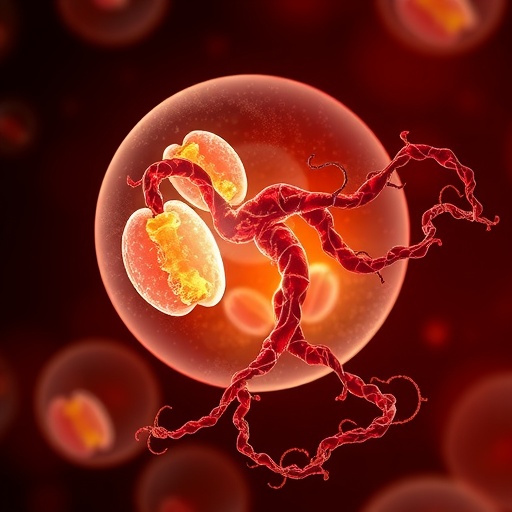In a groundbreaking study recently published in BMC Genomics, researchers have explored the crucial role of embryonic thermal manipulation in mule ducks, revealing its short-term impacts as a significant factor in metabolic programming. The kinetics of embryonic development have always posed fascinating questions in the field of genetics and biology, and this research aims to shed light on how temperature influences growth and metabolic functions at an early stage.
The scientific community has long acknowledged that the environment during embryonic development can shape physiological phenomena later in life. The study began by emphasizing the importance of thermal conditions faced by embryos during critical development phases. Through meticulous experimentation, researchers were able to establish a direct link between ambient temperature fluctuations and changes in metabolic pathways in mule ducks, a breed known for its unique flavor and culinary significance.
The authors of the study—Andrieux, Biasutti, Zwick, and their colleagues—implemented a series of carefully designed experiments where mule duck embryos were subjected to varying thermal conditions. By analyzing growth patterns and metabolic responses, they aimed to identify how temperature affects gene expression and enzymatic activities. This research not only contributes to extending the understanding of environmental impacts on avian physiology but also proposes innovative strategies for improving poultry production.
Embryonic thermal manipulation involves presenting embryos with specific temperature regimes during critical periods of development. The researchers observed that embryos exposed to higher or lower than optimal temperatures exhibited notable changes in metabolic rates. For instance, those under elevated thermal stress displayed alterations in genes associated with growth and stress responses. The implications of these findings are vast, especially when it comes to the poultry industry looking to enhance growth efficiency.
Particularly, the study focused on understanding which specific genes were activated or suppressed under varied thermal conditions. By employing advanced transcriptomic analyses, the researchers were able to pinpoint key molecular pathways that regulate energy metabolism. This understanding highlights the potential for developing targeted breeding programs aimed at enhancing the resilience of mule ducks to temperature extremes—a critical consideration in light of global climate change.
The findings act as a call to action for poultry breeders and agronomists to rethink traditional strategies. By blending knowledge of genetics with environmental science, it is feasible to establish breeding practices that promote better adaptability in poultry. The innovative methods described in the study could also extend to other poultry species, thus having broader implications across the industry.
Moreover, this study opens the door to future research exploring the long-term consequences of embryonic thermal manipulation. While the immediate impacts are being documented, understanding how these short-term effects translate into long-term growth, production, and health outcomes remains largely unexplored. Investigating such relationships might unveil critical insights into the management of poultry species, aligning them more closely with natural evolutionary processes.
The application of the findings reaches beyond academic interest; they carry significant value for food security and sustainability in agricultural practices. As the global population continues to rise, enhancing the efficiency and resilience of poultry production will be paramount. This research provides a roadmap that highlights the intricate relationship between temperature, embryonic development, and subsequent metabolic activity, marking a pivotal step towards optimizing livestock performance.
Scientists involved in the study suggest that future experiments should explore a broader range of thermal variations and potential interactions with other environmental factors, such as humidity and oxygen levels. The nuanced understanding of these multidimensional influences may offer further leverage in improving poultry health and productivity.
In conclusion, the study on the short-term impacts of embryonic thermal manipulation in mule ducks signals a promising avenue in poultry science. By unraveling the connections between temperature and metabolic responses, researchers are laying the groundwork for innovative approaches that could revolutionize poultry farming. The noteworthy implications for the industry are profound, raising the possibility of producing healthier, more resilient birds that are better equipped to meet the challenges posed by a changing climate.
As the research community continues to unpack the intricacies of embryonic development and metabolic programming, the results from this study will likely inspire ongoing inquiry and technological advancements in the field. For those interested in the intersection of climate, genetics, and agriculture, these findings represent a fascinating leap forward, igniting hope for the future of sustainable poultry farming.
Both scientific research and agricultural practices stand to gain from this knowledge, as it reinforces the importance of understanding biological development in the context of environmental changes. With this pioneering exploration into thermal manipulation, Andrieux, Biasutti, Zwick, and their team have made a significant contribution to science, opening up new dialogues and directions for research in the ever-evolving world of agricultural genetics.
Subject of Research: Embryonic thermal manipulation in mule ducks
Article Title: Short-term impacts of embryonic thermal manipulation in mule duck, a kinetic study: new tools for metabolic programming.
Article References:
Andrieux, C., Biasutti, S., Zwick, L. et al. Short-term impacts of embryonic thermal manipulation in mule duck, a kinetic study: new tools for metabolic programming.
BMC Genomics 26, 1010 (2025). https://doi.org/10.1186/s12864-025-12192-7
Image Credits: AI Generated
DOI: https://doi.org/10.1186/s12864-025-12192-7
Keywords: Embryonic development, Thermal manipulation, Metabolic programming, Mule ducks, Poultry science, Gene expression, Environmental influences, Resilience, Sustainable agriculture, Climate change impacts.




